|
View this email in a browser
In This Update:
- Hearing Examines Impact of Governor’s COVID-19 Mitigation Plans
- Governor Outlines Plans to Reopen Pennsylvania
- DiSanto Supports Additional Recovery & Mitigation Bills
- Website Helps Pennsylvanians Support Local Restaurants
- Construction Reopening Date Moved to May 1
- New Online Portal Supports Donations of Critical Medical Supplies
- DCED Announces Business Loan Deferrals
- Temporary License Process Created for Insurance Producers
- More Funding Distributed for Food Assistance
Hearing Examines Impact of Governor’s COVID-19 Mitigation Plans
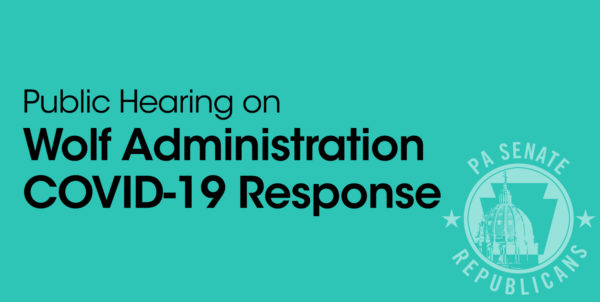
This week, members of two Senate committees explored numerous concerns related to Governor Wolf’s mitigation plans to reduce the spread of COVID-19. The lack of clarity, consistency and execution from the Wolf Administration in some areas has caused lasting harm to employers and pushed more than 1.5 million Pennsylvanians onto the unemployment rolls – more than every state except California.
The hearing offered an opportunity for lawmakers to hear from leading employers and advocates, and also question members of the Administration about the reasoning behind certain mitigation strategies. Topics discussed during the hearing included ways employers could operate safely during the pandemic, numerous concerns about inconsistencies with the waiver process for businesses that wanted to remain open, the timeline for reopening industries and additional steps that could be taken to protect vulnerable populations and prevent the spread of the virus.
Full hearing video and written testimony from this joint hearing of the Senate Veterans Affairs and Emergency Preparedness Committee and the Senate Community, Economic and Recreational Development Committee are available here.
Governor Outlines Plans to Reopen Pennsylvania
On Wednesday, Governor Wolf outlined his plans to slowly reopen the state, region by region, in the weeks and months to come. The plan is targeted to begin in areas with the lowest rate of infection, including the north-central and northwest regions, on May 8. Other regions of the state could follow based on the rate of new infections over the next several weeks.
Under the plan, not all employers will reopen at the same time; different industries would reopen based on their ability to adhere to employee and customer protection guidelines.
Although the timeline is slower than most would like, it is encouraging that we are at least moving in a positive direction to allow more Pennsylvanians to get back to work safely and responsibly. I will continue to advocate for the inclusion of additional businesses that can practice appropriate safety protocols, as well as push the Governor to further clarify the reopening criteria in his plan. More information about the governor’s proposal is available here.
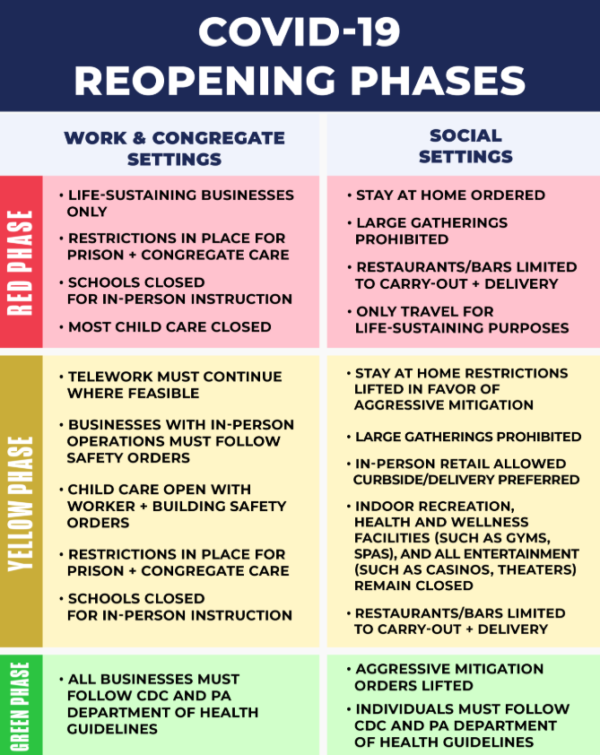
DiSanto Supports Additional Recovery & Mitigation Bills
Last week the legislature passed Senate Bill 613, which would have required the governor to create clear pathways for businesses to operate during the COVID-19 pandemic, based on guidelines issued by the U.S. Centers for Disease Control and the U.S. Cybersecurity and Infrastructure Security Agency (CISA). While the Governor rejected this fair, consistent and reasonable approach to protecting both lives and livelihoods, I continue to advocate for legislation that will help our businesses, workers and first responders, including:
SB 1105 – Allowing Construction Activities to Resume Safe Operation. Pennsylvania was the only state to shut down all public and private construction sites. My proposal would have required the Governor to grant waivers for construction to resume while adhering to CDC guidelines. Thanks to legislative pressure including the passage of SB 613, the Governor has finally agreed to allow all construction activities to resume operations effective May 1.
Business Waivers for Small Garden Centers. I am a cosponsor of forthcoming legislation that will issue a waiver for small garden centers to resume operations. Regrettably, Governor Wolf’s administration deemed these businesses “non-life sustaining” despite many gardeners and farmers looking to buy their plants and seeds for spring planting. This legislation will also level the playing field for locally owned garden centers and the big box garden locations that were allowed to remain open and are selling similar products.
SB 1106 – Payroll Protection for First Responders. I cosponsored legislation moving in the Senate to ensure law enforcement, firefighters, and other first responders continue to receive their salaries should they contract COVID-19 and are unable to work or are ordered to quarantine. These essential workers are on the front lines of keeping us safe during this public health pandemic and cannot always practice social distancing and other safety recommendations in the performance of their duties.
SB 1122 – COVID-19 Crisis Grant Program for Volunteer Fire and EMS Companies. I cosponsored a proposal advancing through the Senate to provide our fire and EMS agencies $30 million in grant funding to help them serve the public during this crisis. Not only are our first responders at risk of exposure to the virus, but the inability to fundraise and a reduction in reimbursed calls during this time has had a significant financial impact on their operations.
SB 1110 – Requiring DOH to Release Communicable Disease Information by Municipality. For the first several weeks, the Pennsylvania Department of Health was unwilling to release the location of COVID-19 infections beyond an individual’s county of residence. This lack of transparency has been detrimental for the public and our county emergency management agencies coordinating the local response. I cosponsored legislation to require the Department to report positive cases of COVID-19 by municipality and after substantial pressure, the Department has finally provided a more detailed map of positive cases.
Website Helps Pennsylvanians Support Local Restaurants

The COVID-19 pandemic forced many restaurants to make drastic changes in operations, including temporarily eliminating dine-in options. A new website helps Pennsylvanians support their local restaurants by providing a list of takeout, curbside and delivery services operating during the public health emergency.
The Pennsylvania Restaurant and Lodging Association developed the new CarryoutPA website to serve as a resource to connect community residents with dine-out options in their area.
Restaurant owners who would like to be featured on the new site can enter their business information at www.carryoutpa.com/join-now/.
Construction Reopening Date Moved to May 1
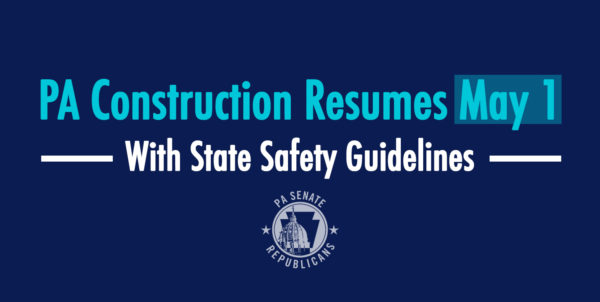
Construction activities that were previously deemed non-life-sustaining will be allowed to continue beginning on May 1. The reopening date was originally set for May 8, but was moved up to May 1 earlier this week.
Guidelines about how these businesses can operate safely during COVID-19 are available here.
New Online Portal Supports Donations of Critical Medical Supplies
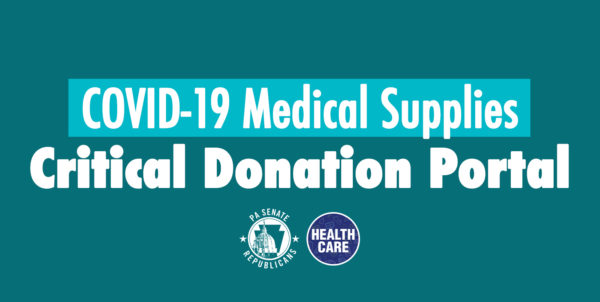
Healthcare providers still have a critical need for medical supplies, including Personal Protective Equipment (PPE) like masks and gloves, as well as alcohol-based sanitizer. A new online portal will help individuals, corporations and community organizations donate these supplies during the COVID-19 pandemic.
The PA Critical Donation Portal will help coordinate donations of PPE to hospitals, medical facilities and emergency management services that need the supplies most. Questions about making a donation can be submitted to PACriticalDonations@pa.gov.
DCED Announces Business Loan Deferrals
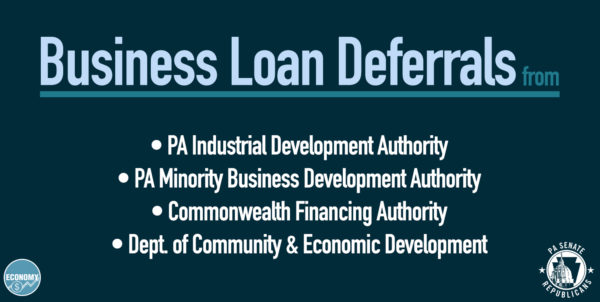
The Pennsylvania Industrial Development Authority (PIDA), Pennsylvania Minority Business Development Authority (PMBDA), and the Commonwealth Financing Authority (CFA) are deferring loan payments for three months, according to the Department of Community and Economic Development (DCED).
PIDA, PMBDA and CFA borrowers (except for PENNWORKS) with payments due in April, May and June are deferred. All other terms and conditions of all applicable loans remain unchanged.
Temporary License Process Created for Insurance Producers
Individuals who wish to pursue a new career in Pennsylvania’s insurance industry can now receive a temporary producer license. Temporary licenses will only be allowed for individuals who are sponsored by an insurance company holding an active certificate of authority in Pennsylvania.
The process to receive a temporary insurance producer license is outlined here.
More Funding Distributed for Food Assistance
Pennsylvania has received nearly $15 million in funding from the federal government to support charitable food efforts during the pandemic. The funding will not only support the distribution of food through the state’s emergency food distribution network, but also ease the additional burdens of transporting, storing and delivering products.
A list of Pennsylvania food banks sorted by county is available here.
|









